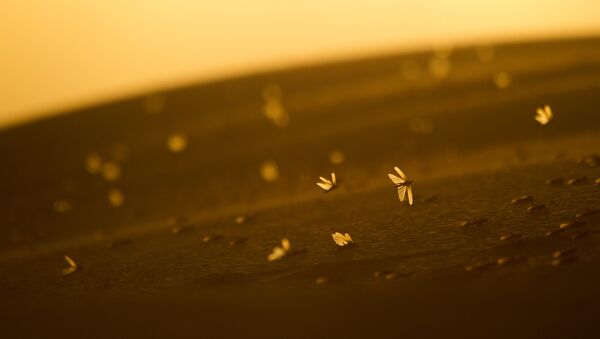The second wave of locust swarms has now entered Gurugram, which is part of India’s national capital region (NCR). The insects also returned to India via the desert state of Rajasthan which shares a border with Pakistan.
Residents of NCR on Saturday took to Twitter to post creepy pictures and videos of the insects, clouding up the skies and hovering over houses. #LocustsAttackDelhi is trending on Twitter in India.
#locustattack reported from Parts of #Gurgaon.
— Weatherman Navdeep Dahiya (@navdeepdahiya55) June 27, 2020
With North/Westerlies gusting above 20km/h, #Locust could possibly reach more parts of #Delhi and national capital region. 🙁 pic.twitter.com/xfXYb8Cla7
Locust attacked at gurgaon beware Delhi..@ArvindKejriwal ji pic.twitter.com/5enb30xWhu
— 𝘒𝘢𝘮𝘢𝘭 𝘑𝘦𝘦𝘵- ʇǝǝɾ lɐɯɐ⋊ (@AAPkaKamalJeet) June 27, 2020
Gurgaon welcomes u...LOCUST🙈🙈#locustattack #Locust #Gurgaon #Delhi #Covid_19 #India #Twitter pic.twitter.com/I5XLZ3X3Jq
— Tamanna Sharma (@Tamanna44153258) June 27, 2020
Now #Locust reaches gurgaon!!
— The Spirited Bong (@Soum17785045) June 27, 2020
✅Meanwhile : Kejriwal wants to seal the borders of Delhi
✅Me : Pancchi, TINDDE, Nadiya, pawan ke jhonke.. Koi sharhad inhe naah roke👇🏻👇🏻
#LocustsAttackpic.twitter.com/hZRG03rtHL
People are also expressing their disappointment on not being warned by the Delhi and Haryana state governments about the possibility of a locust attack.
Locust in Gurgaon, heading Delhi.
— Aansu aaye khud pochna, log aaye sauda karenge. (@mb33422903) June 27, 2020
No news, no warning, no message by HARYANA GOVT. pic.twitter.com/xr1uaDwxGA
Earlier this month, the United Nations Food and Agriculture Organisation (FAO) had noted that the locust swarms would not be able to survive India’s approaching monsoon season.
The insects, however, are expected to return to India’s Rajasthan with the onset of the rains to rapidly mature and lay eggs.
On 24 June, B.R. Kadwa, the deputy director of Rajasthan's Agriculture Department, revealed that the government of India has planned to use Navy helicopters to control the second wave of locust attacks, which is expected to last for a month.


